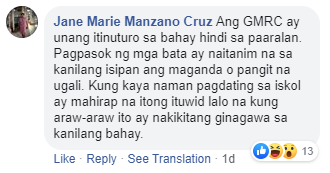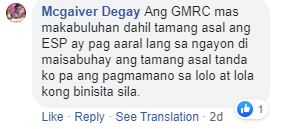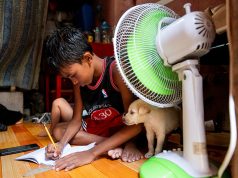The House of Representatives recently passed the proposed legislation on February 4 with 225 votes in favor of House Bill 5829, which introduces the good morals and right conduct in the curriculum from Kindergarten to Grade 3.
This proposed measure consolidated nine similar proposals of inculcating basic etiquette and manners among the youth which were pending in the chamber.
The Department of Education has been assigned to provide the necessary training for GMRC school teachers should this measure be signed into law.
Supporting GMRC bill
Sen. Miguel Zubiri expressed on Twitter that it’s about time to bring back the subject to instill discipline in children.
“Oras na pong ibalik ang GMRC bilang core subject sa school curriculum. This way, matututo ang kabataang Pilipino na maging magalang, disiplinado, at responsible,” Zubiri tweeted on February 5.
“We need it now more than ever,” he added.
Oras na pong ibalik ang GMRC bilang core subject sa school curriculum. This way, matututo ang kabataang Pilipino na maging magalang, disiplinado, at responsable. We need it now more than ever. #TrabahadorNgSenado #SenateSessions #IbalikAngGMRC pic.twitter.com/AeX7cAZPR4
— Migz Zubiri (@migzzubiri) February 5, 2020
Suggestions to restore the GMRC in the curriculum stemmed from observations on the behavior of young students today, an article from an online community of teachers shared.
According to the Teacher Philippines, most students nowadays emulate what they see online, which often challenges basic values such as respect to oneself and one another, honesty and patience.
“Modernization in a globalized village almost always results to confusion in the minds of our youth as the variety of influences make them vulnerable to the pervasive effects of pop culture, which is not always admirable and worthy of emulation,” the article from Teachers Philippines read.
Not supporting GMRC bill
Some Filipinos noted that teaching good morals should start at home and not in school.
“Pagpasok ng mga bata ay naitanim na sa kanilang isipan ang maganda o pangit na ugali. Kung kaya naman pagdating sa iskol au mahirap na itong ituwid lalo na kung araw-araw ito ay nakikitang ginagawa sa kanilang bahay,” one Facebook user said.

A study titled “Values/Moral Education: Current Conceptions and Practices in Philippines Schools” by Michael Arthus G. Muega showed that values learned in the family, school and society are significant in shaping the values of the student.
“De Leon found that there were significant differences in the values of all respondents with respect to seven (7) value areas, namely: (1) unity and order; (2) knowledge and truth; (3) sense of others/fellowship; (4) justice; (5) art and beauty; (6) freedom; and (7) sense of God,” part of the study read.
“Evidence further led De Leon (1995) to the observation that family, school, and societal values have significant separate influences on the values of the student,” it added.
A book by former Sen. Leticia Shahani also emphasized that the goal of every Filipino student is to grow up “maka-Diyos, makabansa, maka-kalikasan, at makatao” (roughly, they respectively mean: godly or devoted to one’s accepted god, patriotic, pro-environment or environmentalist, and humanistic).”
Concerning the proposed GMRC measure, some Filipinos questioned its difference from the current Edukasyon sa Pagpapakatao curriculum, which also covers the same concepts as what the GMRC sought to provide.

Some quipped that President Rodrigo Duterte, who often lets out curse words in official speeches, should enroll as well.
What is GMRC as a subject?
The subject would be part of the ESP curriculum of the Department of Education’s K-12 program as a separate subject.
Part of the proposed legislation read:
“The GMRC shall inculcate among the students the concepts of human dignity, respect for oneself, and giving oneself to others in the spirit of community, for the effective and holistic development of the decision-making skills of the child.”
The subject also aims “to develop the character of the youth by making them recognize their intrinsic human value, enabling them to cultivate their ability to make excellent choices for themselves in relation to the greater community, thereby creating a culture of respect and love for oneself, for others and the country.”










